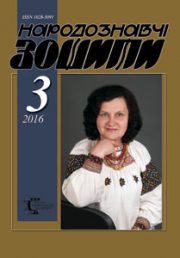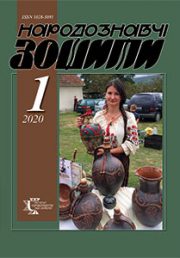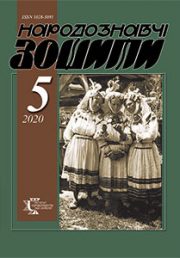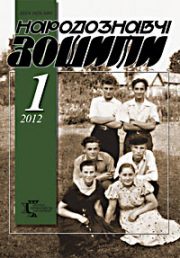The Ethnology Notebooks. 2024. № 4 (178), 777—785
UDK 929:398Гнідич(477.72)
DOI https://doi.org/10.15407/nz2024.04.777
PAVLO HNIDYCH: SCIENTIFIC AUTHORITY AND FOLKLORISTIC HERITAGE
PYATACHENKO Serhiy
- ORCID ID: https://orcid.org/0000-0002-3504-2855
- Сandidate of philological sciences, associate professor,
- Sumy State University,
- 116, Kharkivska Str., 40007, Sumy, Ukraine,
- Contacts: e-mail: pjatachenko@gmail.com
Abstract. The article is dedicated to summarizing and clarifying the biographical information about the Ukrainian folklorist Pavlo Hnidych (1884—1919), as well as outlining and characterizing his scientific legacy, which resulted from years of studying the folklore of a small region in Poltava (now part of the Romensky district in Sumy region).
The relevance of the research is linked to the necessity of incorporating the folkloristic heritage of the scholar into contemporary scientific and educational processes. This deep and comprehensive research is extremely important today, given the pressing issue of national identity due to Russian military aggression, especially in Sumy, a region that has previously undergone significant Russification and now faces very challenging conditions as a border area.
The aim of the research is to summarize and clarify the biographical data of Pavlo Hnidych, which still contains a significant number of gaps, as well as to outline and provide a general characterization of his scientific work.
The object of the research is the biography and folkloristic activity of Pavlo Hnidych, particularly his compiled collection «Materials on the Folk Literature of Poltava Governorate».
The chronological boundaries of the research cover the early 20th century up to 1919, and the territorial boundaries include Romny and the Romensky County of Poltava Governorate (now the Romensky district of Sumy region).
The research methodology is based on the application of biographical and comparative methods. Research methods — to achieve the set goal, the historical-comparative method, typological, complex and retrospective analysis, and biographical method were applied.
Keywords: Pavlo Hnidych, folklore, Romensky County, archival commission, genres, collection.
Received 30.07.2024
REFERENCES
- Rotach, P. (1989). From Hnidych’s Folklore Records. The Light of the Native Home (Pp. 70—78). Talalaivka [in Ukrainian].
- Rotach, P. (1988). Hnidych Pavlo Oleksandrovych. Ukrainska literaturna entsyklopediia (Vol. 1, pp. 434). Kyiv [in Ukrainian].
- Pyatachenko, S. (2004). Folkloristic Activity of Pavlo Hnidych: Monograph. Sumy [in Ukrainian].
- Central State Archives of the City of Moscow. Fund. 418. Desc. 322. Case 414. P. 1 [in Russian].
- (1914). Report of the Poltava Scholarly Archival Commission for 1913. Works of the Poltava Scholarly Archival Commission (Issue 11, pp. 7—12). Poltava [in Russian].
- Gniedych, P. (1915). Materials on the Folk Literature of Poltava Governorate. Ritual Songs (Issue 1) [in Ukrainian].
- (1914). Report of the Poltava Scholarly Archival Commission for 1916. Works of the Poltava Scholarly Archival Commission (Issue 15, pp. 5—19). Poltava [in Russian].
- State Archive of Poltava Region. Fund 3935. Desc. 1. Case 83. P. 18 [in Russian].
- Hnidych, P. (1919, July 1). From the Diary of an Ethnographer. Prosvitianyn-Kooperator, 4, 15—17 [in Ukrainian].
- Hnidych, P. (1919, July 19). From the Diary of an Ethnographer. Prosvitianyn-Kooperator, 4, 11—12 [in Ukrainian].
- State Archive of Poltava Region. Fund 3935. Desc. 1. Case 2. P. 117 [in Russian].
- State Archive of Poltava Region. Fund 3945. Desc. 1. Case. 83. P. 21 [in Russian].
- (1916). Report of the Poltava Scholarly Archival Commission for 1915. Works of the Poltava Scholarly Archival Commission (Issue 14, pp. 4—9). Poltava [in Russian].
- Eleonskaja, E. (1915). (Review). Etnograficheskoe obozrenie, 3—4, 120 [in Russian].
- Gniedych, P. (1915). Materials on the Folk Literature of Poltava Governorate. Non-Ritual Songs (Issue 2, part 2) [in Ukrainian].
- Gniedych, P. (1915). Materials on the Folk Literature of Poltava Governorate. Non-Ritual Songs (Issue 2, part 1) [in Ukrainian].
- Gniedych, P. (1916). Material son the Folk Literature of Poltava Governorate. Tales, Legends, Stories (Issue 4) [in Ukrainian].
- Pyatachenko, S. (2006). Pavlo Hnidych and the Development of Folkloristic Thought in Sumy Regionat at the Beginning of the 20th Century. Folk Art and Ethnology, 5, 93—98 [in Ukrainian].
- Gniedych, P. (1915). Materials on the Folk Literature of Poltava Governorate. Narratives of Cossacks [in Ukrainian].
- Hnidych, P. (1919, June 8). From the Diary of an Ethnographer. Prosvitianyn-Kooperator, 3, 5—9 [in Ukrainian].
- Hnidych, P. (1919, August 30). From the Diary of an Ethnographer. Prosvitianyn-Kooperator, 6—7, 19—21 [in Ukrainian].
- Hnidych, P. (1919, July, 19). From the Diary of an Ethnographer. Prosvitianyn-Kooperator, 5, 8—10 [in Ukrainian].







